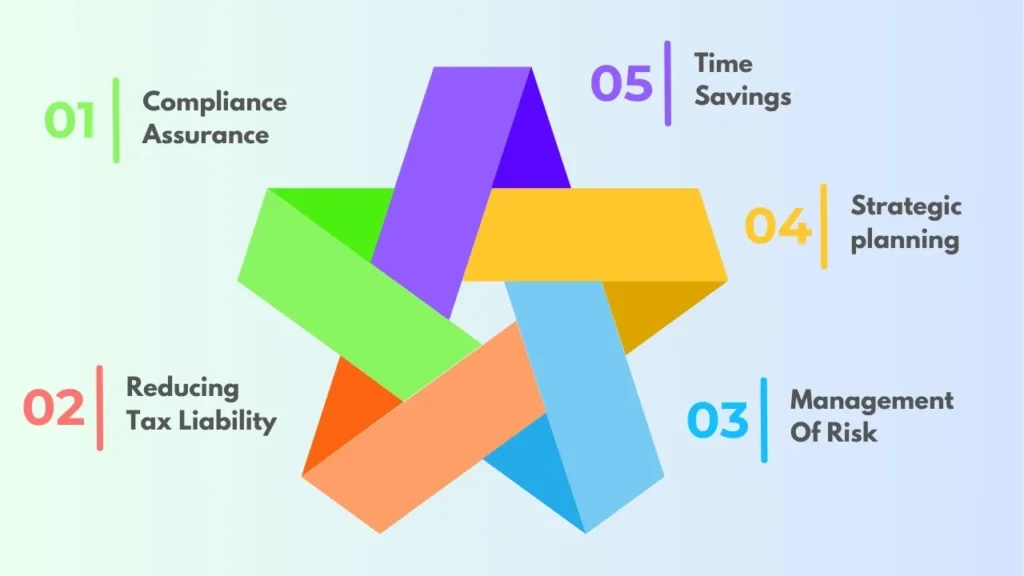Managing tax is increasingly important in the current business environment, and companies need professional advisers with a global view to help them navigate through the financial landscape. Essential Tax Advisory Services Every Business Should Know The type of service offered by a tax consultant can be a large part of how effectively businesses can manage financial matters and save money, maximize tax deductions and eliminate legal loopholes.
Whether you’re a startup or a small-to-large-scale corporation, professional tax advisory service is the basis of both optimal financial planning and business smoothness. This article looks at why good tax-free advice is important as well as areas where businesses can benefit, the services available and why compliance and strategic planning are crucial.
Value of Tax Advisory in Business
Tax consulting services offer full-time assistance to a business, ensuring it understands tax regulations, complies with taxing filing requirements and develops long-term growth strategies.
There is a lot more to taxes than hitting deadlines for compliance; you also want to arrange your finances so that they qualify for exemptions and reduce liabilities.
For any organization, any mistake in managing its taxes, no matter how trivial, could result in severe financial penalties or reputational damage. It’s why corporate tax advice is worth so much more than tax compliance: it secures future viability by integrating your approach to tax with what the business is trying to achieve.
Essential Value of Tax Advisory Services

- Compliance Assurance: Verifies tax returns and filings comply with current local and worldwide laws.
- Reducing Tax Liability: Determines allowable deductions and exemptions that minimize tax obligations.
- Management Of Risk: Avoids disputes with tax authorities by providing reliable and timely advice.
- Strategic planning: Assist businesses with acquisitions, mergers or expansion plans and related tax planning.
- Time Savings: Lessens management’s internal burden by simplifying processes.
By including tax advice in financial planning, businesses create the infrastructure necessary for stability and success.
Key Tax Advisory Services for Businesses
Stick with tax advisory A variety of tax advisory services are provided according to the company’s size, type and business scale. The services that are most important include the following:
1. Corporate Tax Planning
All businesses face tax on profit. Corporations Tax planning for corporations entails the efficient structuring of income, the proper use of losses, and claiming appropriate credits and incentives within the confines of ever-changing statutes. Professional tax advice enables companies to maximize their tax efficiency whilst remaining compliant.
2. Direct and Indirect Tax Compliance
Direct taxes (income tax, company tax) and indirect taxes (GST, VAT, sales tax). Firms are able to help companies correctly file the right returns, as well as properly identify input credits and minimize errors that might bring forth audits.
3. International Taxation
International businesses can struggle with cross-border business matters. International tax services for cross-border operations, treaties for the avoidance of double taxation, transfer pricing laws and global tax reorganization. Companies importing, exporting or dealing overseas find it especially valuable.
4. Tax Risk Management
Taxes: A Case for Tax Automation To be sure, businesses are subjected to new legislation all the time that could affect taxes. Advisors perform risk assessments, forecast the possibility of audits and propose preventive actions. Robust tax risk management prevents costly litigation and penalties.
5. Payroll and Employee Taxation
Managing staff payments and benefits is complicated. Tax advising also simplifies payroll administration by ensuring that withholdings are computed correctly and employee benefits follow the relevant laws.
6. Tax Support for Merger and Acquisition (M&A)
Several tax issues arise when businesses combine or acquire one another. Advisers also try to structure the transactions to be as tax-efficient as possible and exploit exemptions.
7. Advisory on Tax Technology
Today’s compliance demands digital tax management solutions. Today, businesses depend on advisory services to implement tax software solutions that automate filings, record-keeping and audit preparedness.
Direct vs Indirect Taxes
| Feature | Direct Taxes (e.g., Corporate Tax, Income Tax) | Indirect Taxes (e.g., GST, VAT, Sales Tax) |
|---|---|---|
| Definition | Levied directly on income or profits of a business | Levied on goods and services consumed |
| Responsibility | Paid directly by the business or individual | Collected by businesses but paid by consumers |
| Burden | Cannot be transferred to another party | Can be transferred to the end consumer |
| Complexity | Requires detailed financial disclosures and compliance | Requires transaction-based compliance |
| Tax Advisory Role | Optimize income declarations, structure losses, handle audits | Ensure proper filing of indirect taxes, managing input credits |
This contrast shows businesses why they require expert tax consultancy to manage both sides smoothly.
Why Your Business Requires Ongoing Tax Advice
Too many businesses wait until the filing season to ask for tax advice. In truth, advisory is most effective when it’s ongoing. frequent consultation will help companies monitor regulation changes, get its documentation in place and plan for future growth or structural changes.
For example, a business entering a new state or country may be subject to different tax laws. Absent guidance, this could result in double taxation or exposure gaps. A tax advisor-client relationship must be a lasting and active one to avoid such pitfalls while achieving success.
Selecting the Right Tax Advisor Partner
All advisory services are not created equal. When selecting an advisor, businesses should consider several factors:
- Expertise and Experience: Advisers “must bring to the table industry knowledge” of the firm’s business.
- Current Information: The tax laws change all the time and your advisor should be proactive.
- Technology Connectivity: Utilize current technology to manage the implementation of a tax compliance process.
- Global reach: For global operations, you need international tax professionals on your team.
- Credibility: A trustworthy advisory agency takes care of appropriate and transparent tax planning.
A company working with the right advisor is not just compliant but uses that compliance as a competitive advantage through financial optimisation.
Frequently Asked Questions
Q1. What is tax advisory and why a business needs it?
Tax advice includes assistance on tax compliance, planning and optimisation. It enables enterprises to mitigate their liabilities, manage risks and apply taxation in line with growth strategies.
Q2. What’s the difference between tax planning and accounting?
Accounting really honours the recordation and reporting of transactions, whereas tax advisory is to do with specialist knowledge in relation to the legal minimisation of taxes, compliance and risk management.
Q3. Is there any use of care given to tax by small businesses?
Yes. Small businesses have a complex tax situation, even when compared to the aforementioned levels of interest. Professional advice assists them to claim deductions, minimize the penalties and save costs.
Q4. How often should business owners be speaking with tax advisors?
Companies ideally would seek advice in the ordinary course of business and not just during tax season. Ongoing advice will keep you up-to-date with changes in the law and help you plan ahead.
Q5. What are the disadvantages of not considering tax advisory in business?
And if businesses aren’t provided with accurate advice, they can face crippling penalties, mounting liabilities, legal battles and lost opportunities for tax savings.

Leave a Reply